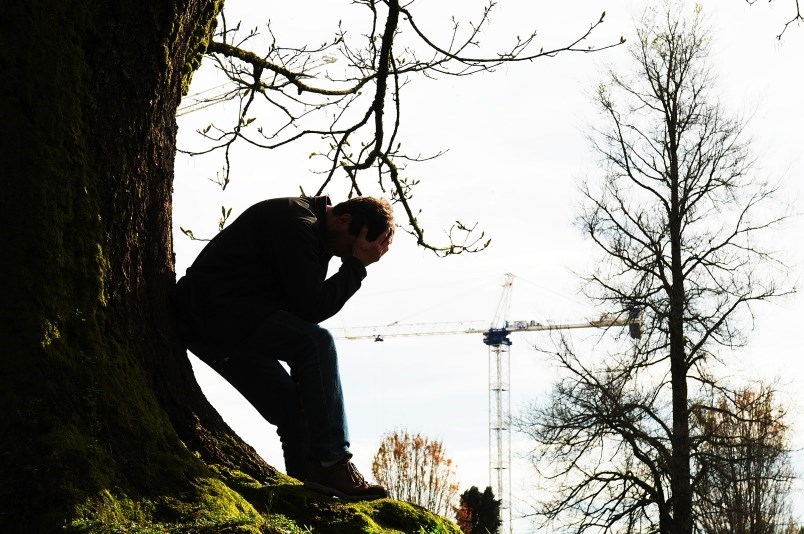If it were any other October than the one James Meger finds himself in, the professional musician would be doing what he does best: playing his electric or stand-up bass in various bands around Vancouver and composing and arranging music.
This month, in fact, was to be the launch of a dance production at the Shadbolt Centre in Burnaby that he and fellow musician Peggy Lee were to collaborate on, with the end result being a full week of shows featuring dancer Ziyian Kwan.
Instead, the 32-year-old Meger, whose talent has allowed him to travel internationally, is living with his partner in a rental suite in Gibsons, collecting employment insurance and not playing much music.
He has become another casualty of the pandemic.
Working in an industry that relies on people getting together in close quarters to write songs, rehearse and play in front of audiences in mostly indoor venues, the job of a musician has proved to be antithetical to preventing the spread of COVID-19.
“All my musician friends have been deeply affected — everybody,” Meger said by telephone this month. “It just completely fell off in the course of less than a week. That’s my whole income. Basically everything just went.”
The sudden shock to the industry is one felt similarly in many lines of work across the city and province, as the food service sector, small businesses and others grapple with a compromised economy.
The unemployment rate in B.C. in September was 8.4 per cent.
That’s 223,000 people out of work.
While job loss numbers are being closely tracked, the mental health of people who can’t work because of physical distancing measures or who were laid off — or had salaries and hours reduced — is not as easily measured.
Various studies, surveys and insight from doctors suggest people are struggling with heightened stress, anxiety and depression, with medical professionals worried a second wave of COVID-19 coupled with the arrival of winter will only worsen the well-being of residents.
A report released this month from the non-profit Angus Reid Institute said the unprecedented drop in public activity, including attending live concerts, visiting community centres and volunteering has taken its toll on Canadians.
“As Canadians have become more isolated, many are voicing concerns about their mental health,” the report said.
“Last year, two-thirds [67 per cent] said their mental health was good or very good; this year just 53 per cent say the same. One-in-five [19 per cent] now share that their mental health is either poor or very poor, with three-in-10 young women [30 per cent] reporting this.”
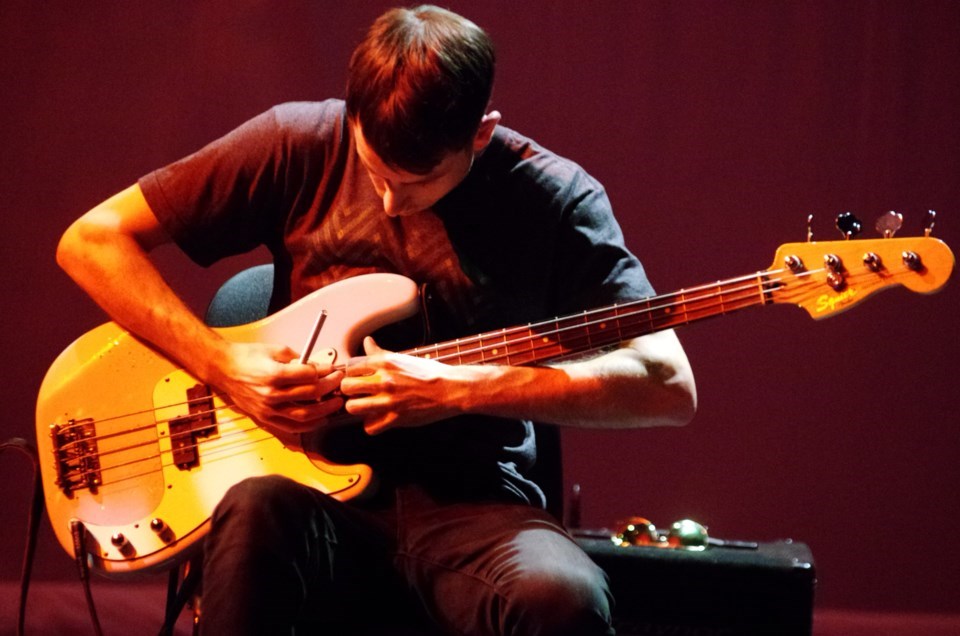
For Meger, the question of how he’s coping with such a sudden shift in his life, is one he can’t definitively answer because he’s only now considering the full magnitude of what it means not to be immersed in his livelihood.
The delay in his response is partly because he was able to land a job as a deckhand on a friend’s fishboat during the spot prawn season in the summer. The 43 days at sea off the Sunshine Coast were good for his mental health, he said, and kept him from thinking about the upheaval in his life.
“I feel like I’m just starting to figure out the answer to that question now,” he said, having lived in Gibsons since June.
“But I haven’t really yet. When it first happened, it was such a shock. Also it was a bit of a relief in a way to just have everything stop. I know it’s weird to say, but things were quite busy. Trying to make a living playing music is very much an ongoing hustle, as it is.”
In his 18 years of work, he has played with a variety of musical acts including The Sumner Brothers, Josh Zubot’s Strings, Sick Boss, Peggy Lee’s Echo Painting, Ten Thousand Wolves and The Bruno Hubert Trio. He toured Eastern Europe with art-rock band, Dark Blue World, and has arranged and written music for many others.
“Now it’s starting to feel like a really long time without playing much music,” he continued. “It’s challenging. It’s a huge part of myself, and how I define myself. And then all of a sudden, it’s not there for you. You kind of need to figure out what you need to do to be OK, and I’m just starting to face that a little bit more.”
He and his partner, who is able to work remotely in her staff job at Simon Fraser University, make sure to take long walks in nature almost every day. Having each other to talk to about what comes next has been good therapy, too.
The tranquil setting of Gibsons compared to life in East Vancouver, where the couple has sublet their rental apartment, has had a positive effect on his mental health, although he knows much of his work as a musician depends on a return to the city.
“We’ve been starting to talk about that and deal with it a little bit,” he said. “It’s going to be a challenging decision. So much of our lives depend on being in the city, so it won’t be super easy, I don’t think. We’ll have to figure that out.”
‘Terrific copers’ challenged
Uncertainty is what psychologist Dr. Christine Korol said is on the minds of many of her patients at The Vancouver Anxiety Centre, where she counsels people — virtually, in these COVID times — for anxiety, depression and other disorders.
“So much uncertainty— that is the main thing that we end up talking about is how to live in a world where we don’t know what’s coming next,” said Korol, estimating the pandemic is a topic of conversation in about 75 per cent of her sessions. “It comes up in almost every session. It might not dominate every session, but it comes up a lot.”
Before students returned to school in September, she was talking to teachers, teenagers and parents about their concerns of being exposed to COVID-19 in what has been the government’s greatest human experiment since the pandemic was declared in March.
“I was saying let’s see how this rolls out,” she said. “It might be a little bit messy in the beginning, but we have to give the schools a chance. But I’ve never seen so much stress in teachers. What they’re dealing with right now is just too much. Even terrific copers are challenged.”
The pandemic, she said, has increased the severity of symptoms related to anxiety and depression in some of her patients, both old and new. What’s also concerned Korol is the recent number of referrals she’s received from doctors for people who are suicidal.
“Every year I get about three or four people who are pretty actively suicidal in my office, and that’s definitely higher even in the last couple of months,” she said. “I don’t know what it’s going to be yet for the year, but I just had three or four in the last month. That’s what I usually get in a year. So that was a bit surprising to me.”
Korol sees about 20 patients per week, with them coming from all walks of life and parts of the province. Along with teachers and teenagers, she counsels trades workers, lawyers, some doctors and stay-at-home moms, among others.
Korol, who grew up in Calgary, is also registered to practise in Alberta, and sees patients virtually from that province, including many from the oil and gas sector. Some of her patients in both provinces lost jobs or had hours reduced and have collected the the Canadian Emergency Response Benefit.
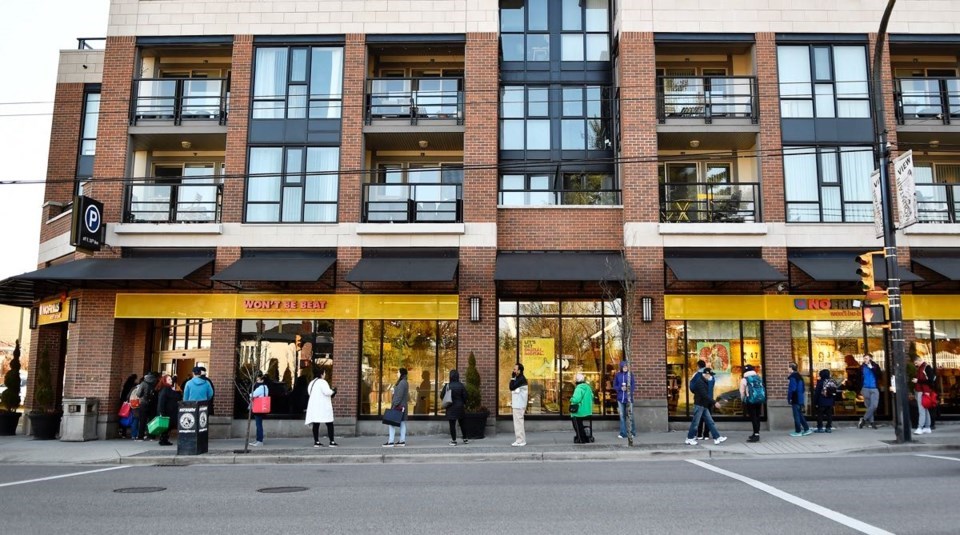
She does a lot of brainstorming and problem solving, she said, when counselling a person who has lost a job — an area she has expertise in having counselled many people in Alberta during the 2008 recession.
“When I work with people who are facing a job loss, we talk about how so many people get through this,” she said. “You have to get creative, you have to cut expenses, you have to find alternative ways to make some money. Sometimes you have to ask family.”
Added Korol: “What’s so scary about job loss is it’s very primal, it’s our food and shelter that we’re afraid of losing, and that’s quite terrifying to most people. But usually when I sit down with people, I’m always impressed how creative they are and how they manage to get through.”
She cautioned, however, that her patients are able to see her because they or a spouse have benefits to cover the cost of the sessions. What her patients are experiencing is not truly representative of the wider population’s mental health, she said, noting many people don’t have benefits, don’t seek therapy or know how to.
She advised people who want to seek help to call their local community health office.
The Access and Assessment Centre at Vancouver General Hospital can provide a list of resources. So can universities, which offer low-cost or free sessions via supervised student therapists, and the Ministry of Children and Family Development.
At the same time, Korol said a family member or friend should not seek therapy for a person they’re worried about, unless they are a willing participant.
“You can’t force anybody,” she said. “There’s research on this showing that the majority of people who go to therapy have been thinking about it and reading self-help books for four to six years. So it’s not something that people just pick up the phone.”
For some people, activities such as cooking or drawing or gardening — which is something a musician friend of Meger’s began doing this year — are outlets to help put their minds in a more peaceful place, Korol said.
Exercise, staying connected with friends and family, accomplishing small tasks, listening or playing music have also proved to fight depression, she said, emphasizing that people have to trust they can cope, despite what the pandemic has done to their mental health.
“I think that’s the number one message through all of this: trust that you can cope, and focus on what you can do, given the limitations, especially as we head into winter,” Korol said.
“I’m a little nervous about what the poor weather is going to do to everybody’s mood because we’re losing a lot of our outdoor activities as the weather changes.”
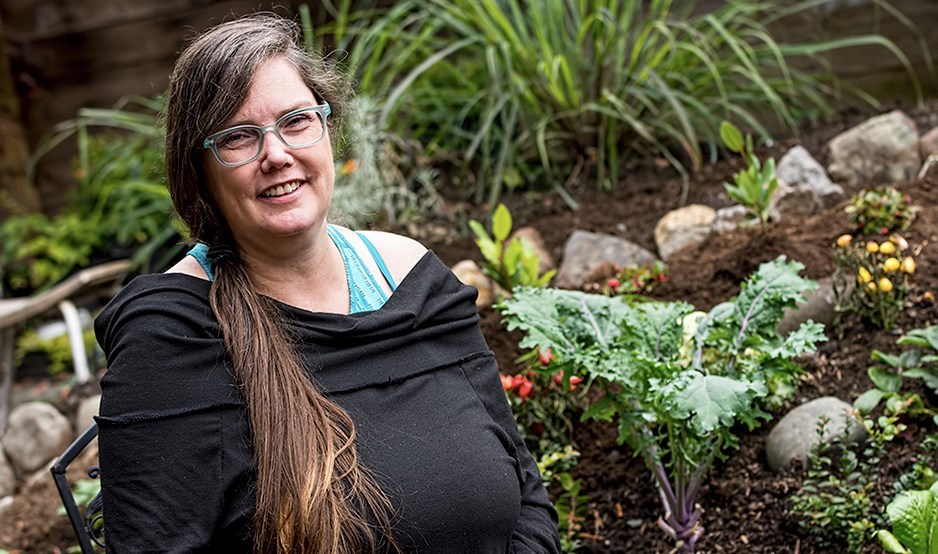
Garden therapy
Lisa Cay Miller is the musician friend of Meger’s who planted a vegetable garden this year in her yard near Commercial Drive.
“That’s the thing that’s helping me,” said Miller, a jazz pianist and managing artistic director of the New Orchestra Workshop Society, located in Chinatown. “I spend an hour or two a day in the garden, growing food.”
Is that your therapy?
“Yes. I’ve had some therapy also, but this is even better than therapy — getting your fingers in the dirt. There’s a sense of security and control from growing food, and from designing something and seeing the effect you can have on it. You see the change. My yard was a pile of weeds, and now I’m going to try and have every part of my yard for growing food.”
Added Miller: “It’s something I always thought I would do, but that’s when I started it — when the pandemic happened — because you’re at home and you can’t go anywhere. But you can go out in your yard. I’m very thankful to have a yard to go out in. It’s safe and there’s no anxiety in a yard.”
Miller is also thankful to have a job, however precarious and stressful it is in these times; she estimates she has lost about 30 per cent of her employment as a musician. That stress is compounded by seeing friends such as Meger not playing music, and therefore not making money.
She has had to cancel shows, move scaled-down performances outside of the NOW Society’s space known as 8EAST to a small plaza — when the weather’s good — and get innovative with connecting musicians online with livestreams and collaborations.
The NOW Society, which was founded in 1977, is an improvisational music centre that has an ensemble (Meger is a member), conducts workshops and collaborates with international artists. The pandemic’s effect on the rhythm of such a thriving collective is hard for Miller to put into words.
“As a leader, I feel a responsibility to try to figure out how to pay people and…,”she said, her voice breaking before finishing her thought “…and how to give opportunities and be responsible for people’s safety.”
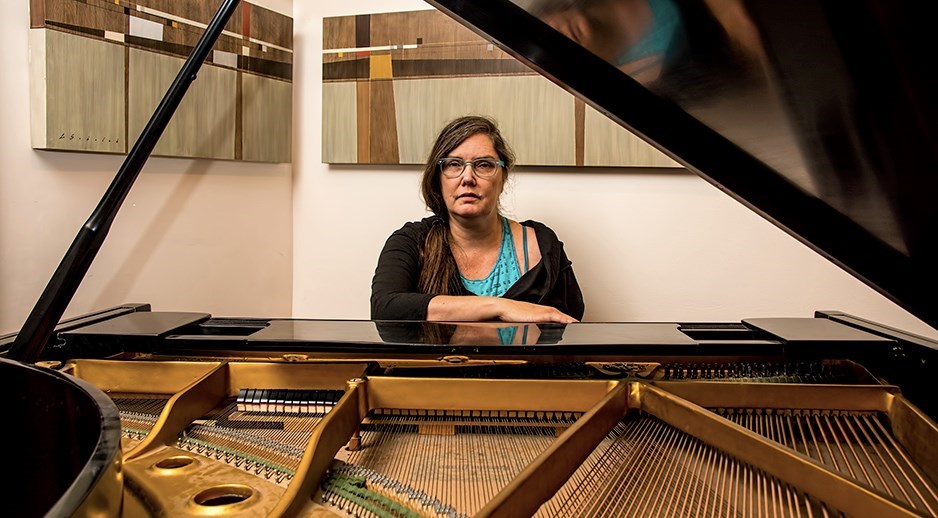
What helped in the first few months of the pandemic, she said, was a music series the society launched that had a musician — including some in other countries — record a piece of music and send it to a recording engineer who would send it to another musician.
In the end, 36 musicians were involved.
“I think for a lot of the musicians in that program, it helped us get through the most intense part of isolation because it was right in the thick of it, and we recorded just with what we had in our homes,” Miller said. “That was a positive thing and a new way of working together.”
‘Not considered essential’
Asked what her year would have looked like at this point in the calendar —if the pandemic hadn’t arrived — Miller listed a number of plans that never materialized, including trips to Berlin and Mexico to play in music festivals and travels with her son.
Celebrated multi-instrumentalist Douglas R. Ewart from Minnesota would have come to town, too, and played with Vancouver musicians. And the 8EAST space would have been the scene of events almost every night, with 20 to 30 people connecting musically.
“But we’re not considered essential,” she said.
“It’s so interesting because people turn to art and music in tough times — or they binge watch Netflix, or listen to music, or these sorts of things to help cope, but then they’re not considered essential. I’ve had conversations with people who really have no idea that this sector of the economy — or of people — are suffering so much at this time.”
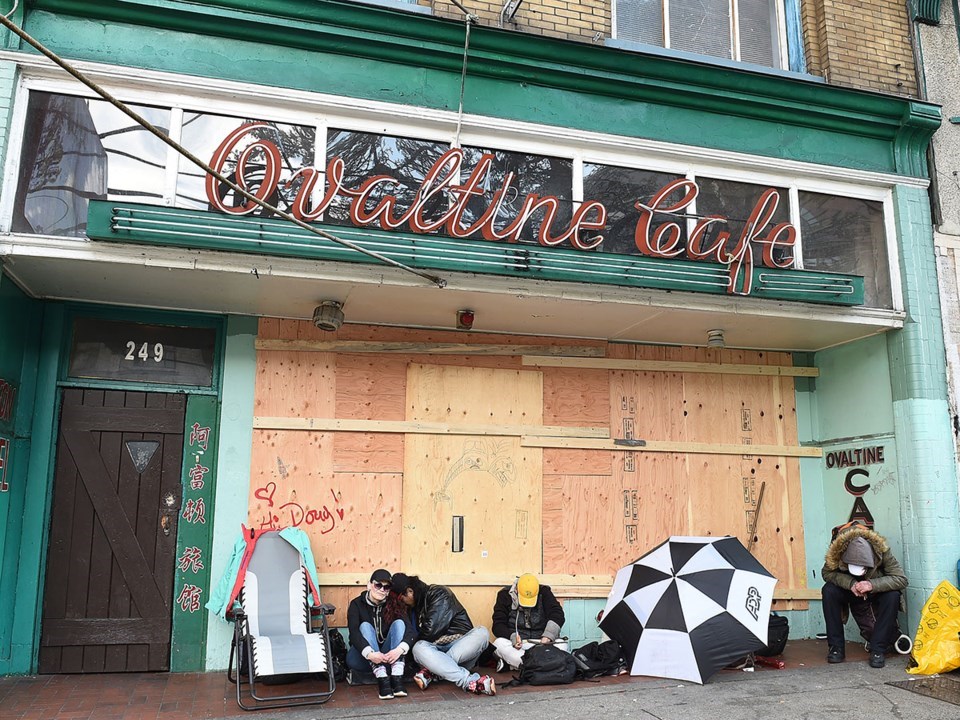
That said, Miller emphasized there is a greater community of people in dire need of support during the pandemic, as evidenced by the state of humanity outside the 8EAST space, which is in the same building as the Chinese Cultural Centre at Pender and Carrall streets, where homelessness and drug activity is common.
“The overdose crisis was already bad, and it’s worse now,” she said, adding that she wished Provincial Health Officer Dr. Bonnie Henry would announce the number of overdose deaths each day in her COVID-19 case updates.
Staff at the NOW Society have had Naloxone training.
Police and city officials have said racism — particularly against the Asian community — and homelessness are other issues made worse by the pandemic, with the Chinese Cultural Centre being targeted with racist graffiti and people living on the street estimated at 750.
That is the context Miller wants people to consider as they contemplate their lives during the pandemic.
“Wealthier people and those with stable incomes might not feel mental health pressures related to COVID as much as others,” she said.
“It’s harder for those with precarious or contract-based employment, people in the service and entertainment industry, artists, marginalized people. We are all dealing with isolation. But these types of livelihoods and identities are more threatened by COVID safety measures. Isolation is intensified with loss of work, and it is harder to cope during this pandemic with added financial worries, loss of structure and connection.”
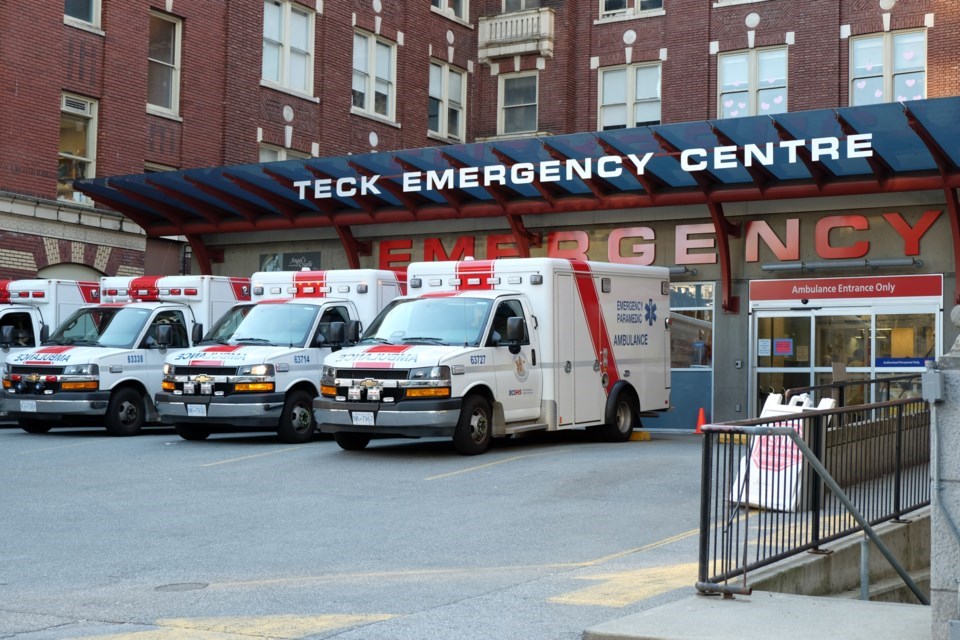
Mental health calls to police, paramedics
If there is any good news to take from the pandemic, it’s that statistics collected by the Vancouver Police Department between March 12 and Sept. 30 don’t match up with studies suggesting more people are in bad shape mentally.
Compared to the same period in 2019, the number of mental health-related calls are down four per cent, from 7,807 files last year to 7,476 this year. Suicide calls have also decreased, with 1,503 reported this year compared to 1,738 last year, for a decrease of 14 per cent.
But Const. Tania Visintin, a media relations officer, cautioned the statistics are what is reported to police and don’t capture people who may be going through a tough time, but have had no dealings with police.
“Maybe everybody is feeling down, but it’s just not coming in to our stats,” Visintin said. “There’s a lot of different factors into when the police are and aren’t called.”
Domestic or intimate partner calls increased seven per cent this year, with another category police describe as “domestic files” up nine per cent. Visintin cautioned again the statistics don’t truly reflect the magnitude of violence or crisis a person is in because many are afraid to call police on their partner.
“When it comes to domestic calls, we were seeing that they were down during the lockdown, which goes against what we would think,” she said. “But then as the summer came, and things opened up a bit more, things changed and we’re seeing domestics are up. So it’s hard to make sense of them.”
Across the province, B.C. Emergency Health Services saw an increase in mental health-related emergency calls in May, June and July, with June (2,117 calls) seeing the highest year-over-year increase at 14 per cent.
The coding for those calls answered by paramedics were related to psychiatric issues, abnormal behaviour and suicide attempts, according to information supplied to Glacier Media from B.C. Emergency Health Services.
The call volumes decreased in August (1,876) and September (1,790), but were still higher than last year’s totals for those months, with 1,845 last August and 1,741 in September 2019.
Vancouver averages about 450 mental health-related calls per month, with June (507) and July (506) of this year showing a slightly higher call volume. The call load dipped significantly in August to 406 and 362 in September.

‘Reach out for help’
At the University of B.C. is where psychologist Dr. Nancy Sin and colleagues have been trying to capture more data about how people are coping with their mental and physical health during the pandemic.
The work has involved the collection of people’s thoughts, feelings and behaviours related to the coronavirus outbreak through surveys of more than 1,000 people in Canada and the United States.
The good news: People who volunteer, who provide or receive emotional support to or from others, or pick up groceries for a neighbour or friend, who exercise and get a good night’s sleep report being able to cope better at this time.
That may seem like common sense.
But Sin said the feedback showing people are helping each other — and that community support groups have formed spontaneously — is a positive sign at a time when so many others are buried in stress, particularly younger and middle-aged people.
“Younger and middle-aged people are more stressed and they have more negative emotions and fewer positive experiences during this time,” said Sin, noting the findings highlight the fact this age group is overwhelmed with responsibilities.
“And that’s important [to know] because it means that there’s kind of a lack of positive resources that we can draw upon to counteract the stress.”
Job loss, financial strife, working from home with young children is driving the stress, Sin said, but added the threat of contracting COVID-19 is being felt from all people. Ironically, older people — who have been hit hard by the virus — are more likely to do much of the giving, receiving and volunteering.
“So I think this counteracts a bit of the narrative about the psychological vulnerability of older adults,” Sin said. “This really shows that one of the ways to cope with the stress of the pandemic is to ask people how they’re doing and to not be afraid to reach out for help.”
She, too, is worried about the change of seasons, saying “I do think it’s going to be a challenge over the winter.” But Sin qualified her statement by pointing to studies that have shown weather isn’t the biggest determinant of a person’s decline in mental health.
“I do think we tend to overestimate the effect weather has on our well-being,” she said. “We have so many things going on in our lives. Daily activities and family and work tend to have the biggest impact [on mental health], not the weather as much."
‘It was kind of my whole world’
Gloomy weather of the B.C. kind is something Meger is familiar with, having grown up in the Lower Mainland.
In fact, he said, the grey, rainy days in Gibsons can be beautiful.
Typically, the fall and winter months are a time of year for him to hunker down with work. He’s been writing some music and contributing to a few long-distance recording projects.
But that’s about it.
Meger knows this winter will be unlike any other in his career, with live shows improbable.
“There’s something about it that I don’t get from anything else — connecting with an energy in a room in real time,” he said. “It’s its own feeling.”
Asked to describe what music does for him, Meger spent some time thinking about it before answering.
It’s spiritual in a way that's really hard to describe, he said, and produces euphoric physical and emotional feelings. It is part of how he makes sense of people’s relationships and their interconnectedness. It’s also how he earns a living.
“There’s all these things. It’s very deep for me in that way, and pervasive. It kind of encompasses everything. It was kind of my whole world.”
Meger spoke to Glacier Media the same day Dr. Henry announced 499 people in B.C. had been infected with COVID-19 over a weekend. Since then, the province also broke a single-day record with 317 new infections reported.
Active cases have surpassed 2,300, hospitalization rates are up and more than 260 people have died from the virus, with Henry acknowledging the province is now experiencing a second wave of infections.
Meger said he is taking the one-day-at-a-time approach to life.
So what’s 2021 look like for him?
His response wouldn’t surprise anyone asked the same question.
“I honestly don’t know.”
@Howellings
